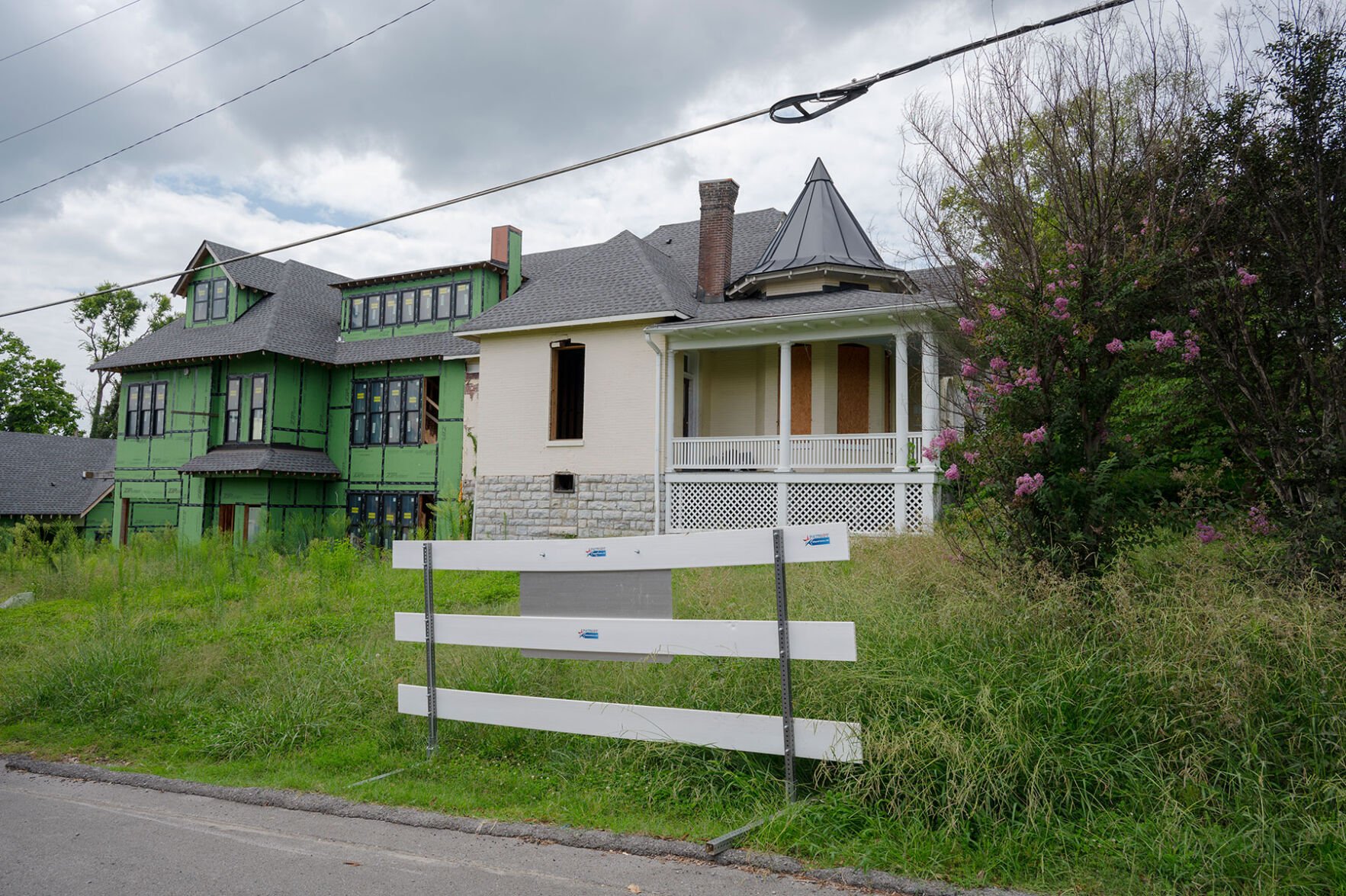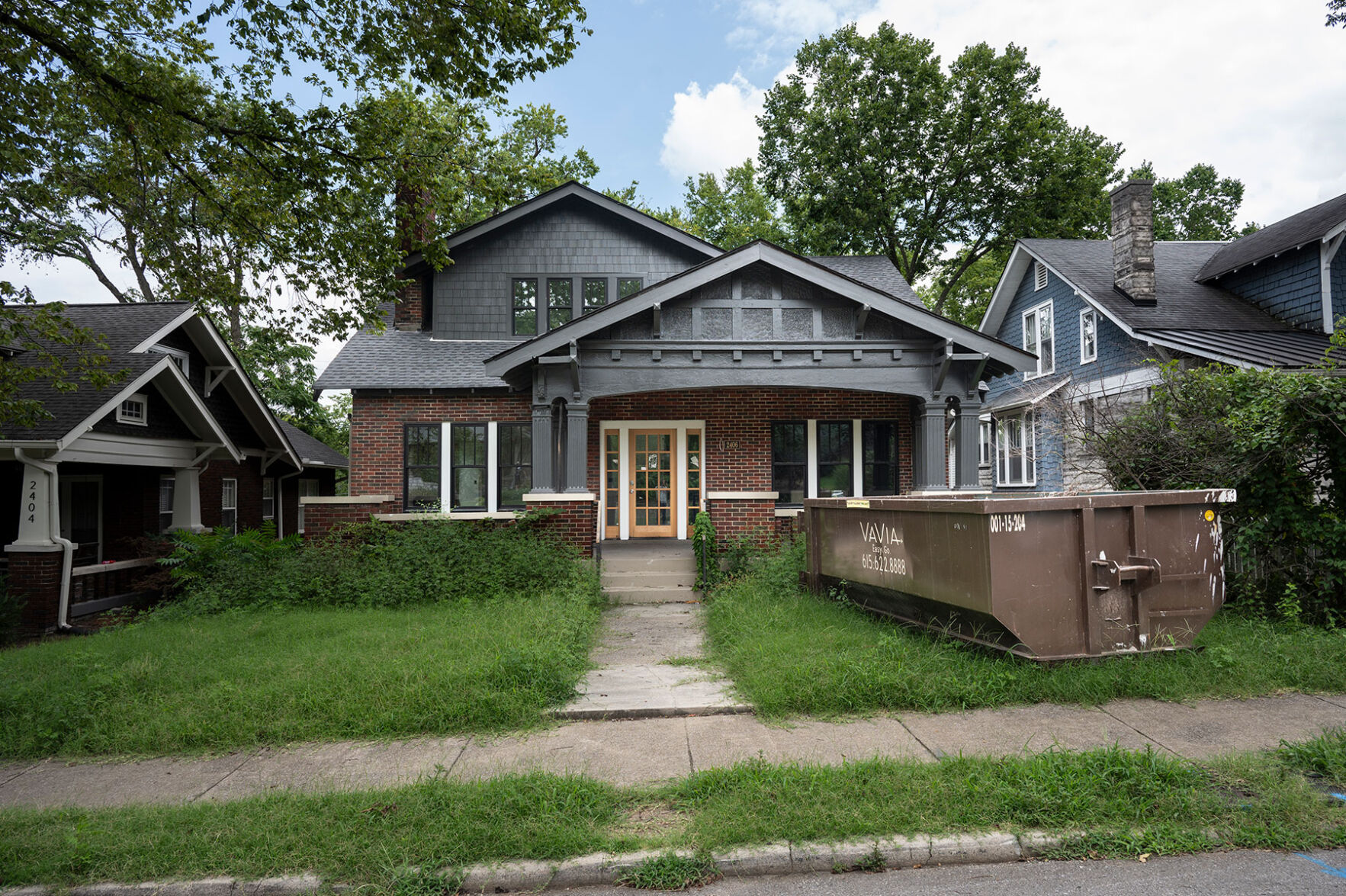Prickly towers of horseweed have shot up almost five feet in the yard of 2814 Kenway Road. The sprawling single-level home in Green Hills sold in 2021 for $1.1 million, on par with a red-hot market that has fueled a flipping boom on the city’s affluent West Side. Once an enclave for the city’s middle class — particularly white families fleeing integrated neighborhoods in the 1970s and 1980s — Green Hills is full of modest homes on spacious lots that have become prime targets for real estate investors to tear down, rebuild and sell. For those who could raise capital and stay organized through a mess of construction costs, invoices, contractors and leveraged debt, it was possible to double or triple investment in the upper echelons of Nashville’s boom housing market.
Brian Layton couldn’t. His bankruptcy case has left a trail of million-dollar homes in visible states of disrepair across 12South and Green Hills. A spate of lawsuits has revealed tens of millions of dollars in debt spread out across a vast network of LLCs connected to Layton in various states of legal and financial trouble.

1501 Linden Ave.
All told, Brian Manookian, an oft-disciplined attorney who has since pivoted to private equity, started following the debt-distressed properties in hopes of finding his own business angle. As legal proceedings continue to reveal an impossibly complicated web of debt and credit, Layton’s downfall has become something closer to schadenfreude for Manookian, who set up a website to document the collapse and to field complaints about Layton. He gets constant complaints from Layton homebuyers about shoddy work and rushed renovations.
“I think about whoever might have the misfortune of buying these houses,” says Manookian. “They’re polished turds.”
By Manookian’s estimates, organized on a color-coded spreadsheet, Layton has $51.2 million in debt across 20 properties held in nine LLCs.
Breckenridge Investments owns four more properties, including a 7,000-square-foot behemoth on Marengo Lane — one of Layton’s few finished products, currently listed for $3.5 million. Another, 2400 Bear Road, sits like an overgrown castle near the three-way stop at Valley Brook. Great mounds of construction dirt have sprouted thick layers of vegetation. Empty soda bottles and building materials are scattered along a wide unfinished gravel driveway. On Aug. 11, Metro hit the property with a codes violation for weeds more than 12 inches high.

2406 Oakland Ave.
Nashatlantic Holdings LLC owns 2600 Acklen and 2406 Oakland. Layton bought 2600 Acklen via LH2 investments for $667,000 in 2021, then sold it to Nashatlantic for $1.8 million a year later. He’s the registered agent for both companies. Now it’s on the market for $2.95 million, down from $3.25 million in May. Meanwhile, overgrown nimble will is slowly taking over 2406 Oakland, a renovated Belmont-Hillsboro bungalow. In person, it’s in far worse shape than the stately photos in its $3.5 million Zillow listing. A handful of other LLCs own a few more properties, including the corner lot formerly home to Pilgrim Emanuel Baptist Church at 945 S. Douglas. This site is the focus of an ongoing lawsuit in which musician Chris Isaak, a onetime business partner, alleges Layton borrowed more than $2 million against their jointly owned property to fund his other LLCs. It’s an indication that Layton was commingling funds between projects, a bookkeeping no-no that could melt the legal barriers insulating each holding company.
In September, another Layton LLC, McClain Investments, filed for Chapter 11 bankruptcy. Layton’s high-risk business practices started to spill out onto the public record, shedding light on the debt he’d racked up on four properties — two neighboring houses on Ashwood, one Victorian on South Douglas and a cozy house in Green Hills around the corner from Kenway, on Sugartree. All were maxed out to lenders. The Ashwood houses sold in the spring, and the other two were taken over by the creditor, Dallas-based Bell Rock Income Fund.
Unlike Chapter 11 — a plea for the court to hold creditors at bay so a debtor can reorganize and restructure — Chapter 7 bankruptcy forces an owner to give control of an entity to a third party. This is the situation for Grandote Investments, Layton’s LLC that owns properties on Linden, Beechwood, Oakland and Mountainview. The last one — an unimproved lot that Layton bought in 2021 — sold on July 20 for $775,000. Grandote owed $600,000* on it and $9.65 million on the other three, all of which are up for sale right now, half-finished. Based on current listings, Grandote will come up at least $1.5 million short. In June, federal trustee Eva Lemeh took over Grandote’s portfolio.
“My job is to liquidate assets of the debtor and distribute funds to unsecured creditors,” Lemeh tells the Scene. “It is not a quick process.”
As Grandote’s bankruptcy progresses, it could start to touch Layton’s other homes held under different names. Lying is the difference between a bad bet and fraud; whether Layton’s business practices are proven outright dishonest or irresponsibly aggressive, he might have truly believed that a few good sales in one of the nation’s hottest markets could wipe away millions in debt.
“Just let me know if you can get that grass mowed,” says Jim Hicks, who lives next door to Layton’s overgrown castle on Bear Road. Hicks was out picking up trash on the street one Tuesday evening when the Scene was in the neighborhood. Hicks has lived in Green Hills for decades, he says, since Hillsboro was a two-lane country road.
“The neighborhood has had it up to here with this guy,” says Hicks, holding his hand horizontally up next to his chest.
*Update: After the publication of this article, U.S. Trustee Eva Lemeh told the Scene that Grandote’s Mountainview property fully paid off close to $600,000 in debt — not $850,000, as this piece initially stated — aided by the fact that federal trustees can void liens based on Chapter 7 bankruptcy code.




